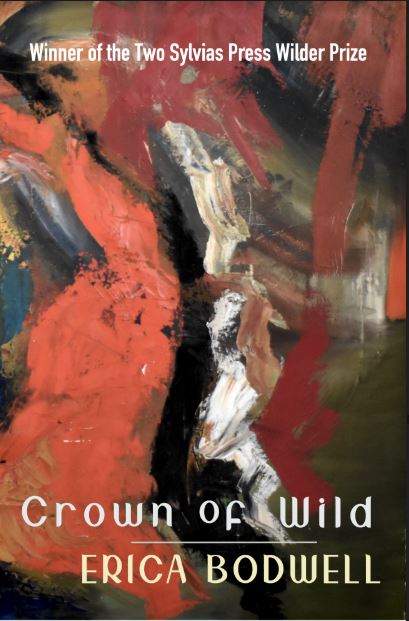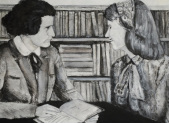Praise for Crown of Wild
“What is the sound of in ruins, broken?” In Erica Bodwell’s striking debut, brokenness is inflected with pain and also with beauty. Bodwell knows how humans get damaged and do damage, and sticks close to the stressed and womanly body: its sensations, its pressures, what impinges on it, how it breaks free—or how it can’t. Her sounds are dense and vivid, her characters in these formally-varied lyric narratives are as real as characters in short stories. This is a book I’ll keep coming back to. — Daisy Fried
In Erica Bodwell's Crown of Wild, there are many kinds of wildness. There is the wildness, for instance, found in a young woman's coming of age, her discovery of both desires and betrayals along the way. There is also the ugly wildness of the pervasive violence against women, especially sexual violence, within the family and in the world beyond. But there is another kind of wildness at work within all these poems. At every turn, this poet sizes up her world for both its menace and its occasional but fleeting beauty. With razor-sharp diction and stunningly original associations, Bodwell's poems show us that becoming a whole person does not happen by accident. It requires courage, resilience, and, in this case, an unflinching intelligence. These strengths bring the poet to what she calls her own "bright freedom." Such freedom is an authentic and durable "crown of wild," and this book is its story. — Fred Marchant
Can a book of poetry be sexy and sad at the same time? It can if its speaker is inquisitive enough. If she’s wide-ranging and empathetic and forgiving and observant enough. This book of American womanhood rises out of a sensually-grounded tension between “wildish things” like our speaker’s “tresses [like a] nest of milky way & glitter-grouse” and real dangers that lock her into “white-hot needles [of] navy narcotic / oceans” or imaginings of real-world slayings and other sins. Crown of Wild is a street-wise “long waltz with the night” grounded in smart mournful tones. But it does not once give in to self-pity or regret. In fact, Crown of Wild is a joyful book, taking its pleasures out of the redemptive possibilities of both language and life. The lament here is real, but so is the frolic and play. And that’s why you should read it and will love it. — Adrian Blevins
Sample Poem:
Aubade in Which Grace Appears
We were damaged. We hurt people. We were called selfish so
many times we figured what the fuck and slid the last piece of steak from our
grandmother’s plate. We stole pints of rum raisin even though the raisins thawed
and spread like sticky insects on our tongues. We took it out on each other, oldest
to youngest, until the dog got a bonnet tied so tight his eyes bugged out. We
grew up and left that place, refugees--
We acquired husbands, student loans, a penchant for carving
letters lightly into our forearms, kittens that kept coming. We left lovers in pick-up
trucks to race home and open cans, scratch under wishbone chins. We got therapy.
We went for walk after walk after walk in the woods. We filled the sink with hot
water and washed dishes every day.
We stacked folding chairs, jiggled our knees when we sat, got
sober standing before a chain link fence, pressing our foreheads to the grid. We
were sorry and said so, and after a while our wheels ground to a gravelly stop. We
didn’t know any better. And then we did.
Aubade in Which Grace Appears
We were damaged. We hurt people. We were called selfish so
many times we figured what the fuck and slid the last piece of steak from our
grandmother’s plate. We stole pints of rum raisin even though the raisins thawed
and spread like sticky insects on our tongues. We took it out on each other, oldest
to youngest, until the dog got a bonnet tied so tight his eyes bugged out. We
grew up and left that place, refugees--
We acquired husbands, student loans, a penchant for carving
letters lightly into our forearms, kittens that kept coming. We left lovers in pick-up
trucks to race home and open cans, scratch under wishbone chins. We got therapy.
We went for walk after walk after walk in the woods. We filled the sink with hot
water and washed dishes every day.
We stacked folding chairs, jiggled our knees when we sat, got
sober standing before a chain link fence, pressing our foreheads to the grid. We
were sorry and said so, and after a while our wheels ground to a gravelly stop. We
didn’t know any better. And then we did.


